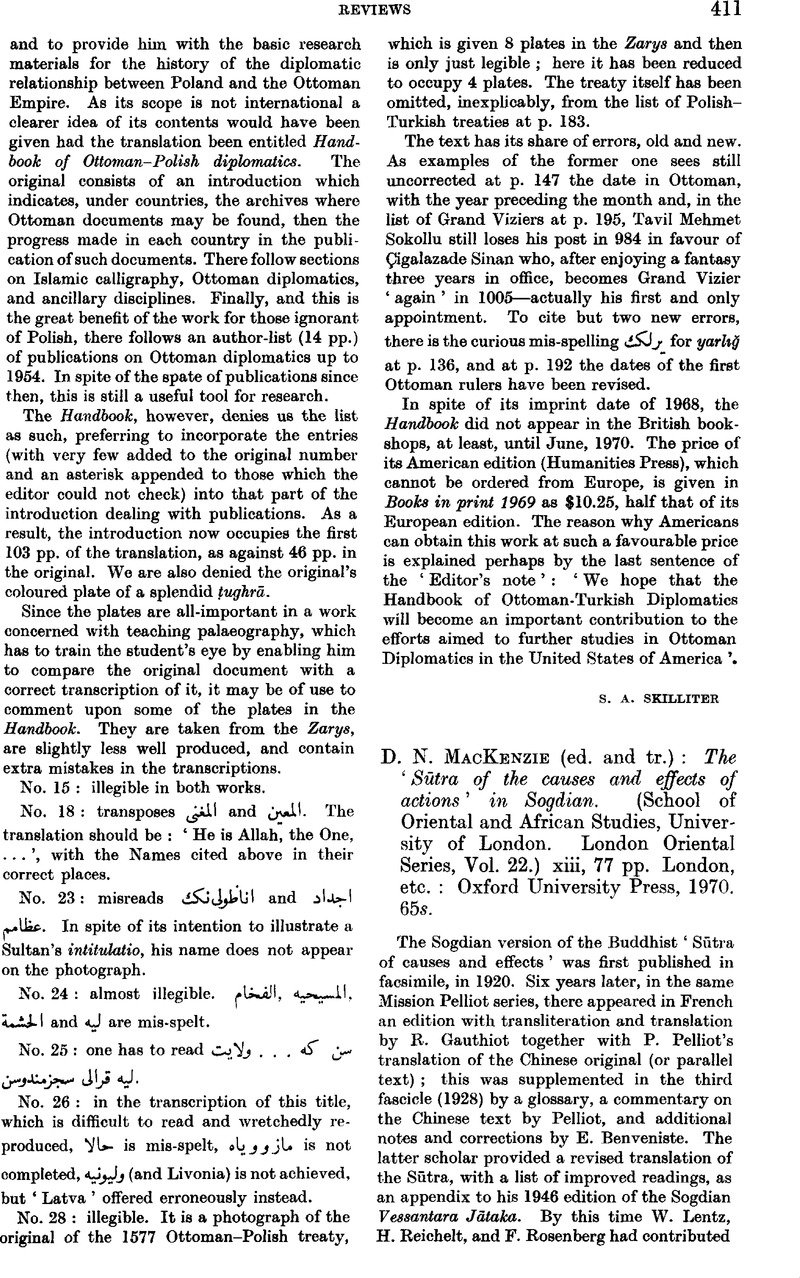No CrossRef data available.
Article contents
D. N. MacKenzie (ed. and tr.): The ‘Sūtra of the causes and effects of actions’ in Sogdian. (School of Oriental and African Studies, University of London. London Oriental Series, Vol. 22.) xiii, 77 pp. London, etc.: Oxford University Press, 1970. 65s.
Published online by Cambridge University Press: 24 December 2009
Abstract

- Type
- Reviews
- Information
- Copyright
- Copyright © School of Oriental and African Studies 1971
References
1 In this review, abbreviations for well-known Iranistic publications follow those given by MacKenzie, pp. xi ff. For names of languages I use the following abbreviations which depart from those of MacK., loc. cit.: B = Buddhist (Sogdian); Chin. — Chinese; Chr. = Christian (Sogdian); Khwar. = Khwarezmian; Man. = Manichean (Sogdian), but Man. MPers. = Manichean Middle Persian; NPers. = New Persian.
2 √sap = ‘look after, attend to, venerate’ = Av. √hap. In Yasna 31, 22 ašam … hapti ‘he serves (= upholds or venerates) Truth’ = RV Ham sap-; Yasna 43, 4 hafšī… ašīš ‘you serve (= attend to or mete out) the rewards’, cf. sapante abhi with obj. rātim ‘gift’ RV 7.38.5. The usual translation of √hapas ‘hold’ goes back to Bartholomae, who incorrectly compared Gr. ἄπτω
3 Studies in the texts of the Sogdian Christiana (Ph.D. thesis, University of California, Berkeley, 1967)Google Scholar; copies available from the author.
4 p. 508, 1. 5, in the facsimile published by Atalay, Besim, Divanü lûgat-it-Türk tipkibasimi, Ankara, 1941Google Scholar. I am at present without access to any editions of Kāshgharī, , or any indexes other than Brockelmann's Mitteltürkischer Wortschatz nach Mahmūd al-Kāšyarī's Dīvān luyāt at-Turk, Budapest, 1928Google Scholar.
5 I thank Mr. Raymond Tang of the East Asiatic Library of the University of California, Berkeley, for his help with details of the Chinese.
6 The clearest and most interesting example I know occurs in a fragment of the same Psalter mentioned above s.v. ‘ρω’δ'k/y. Here Syr. wn‘drk šm’ d‘lhh dy'qwb ‘and may the name of the God of Jacob help you’, Ps. xx, 1, is translated by Sogd, . ['tyykwp γypδ n]' (m) mr'z β't [tw' or kw tw' s'r] in the translation of Ps. xix, 14Google Scholar, the same fragment has mn' mr'z = Syr. 'dwry ‘my Helper‘. [Concerning my reconstruction of the Sogd. transcription of y'qwb: for Sogd. γ = Syr. ‘cf.‘ yšωγ = yšw' (East Syr. pron. Išō') ‘Jesus‘ in the Nestorian Creed (ST, I, 84.3), which I am convinced was written by the scribe of the Psalter; cf. also the regular employment in texts in Syr. script of ‘for the Sogd. sound γ. One would expect Sogd. *yγkwβ = Ya'qōβ, but -wp (= .*ōb) is guaranteed by ](w)p γypδ βγ' ‘O God of Jacob‘, Ps. xxiv, 6; however, t'wyδ = Dāwīδ in the Psalm titles.]
7 Thus Atalay's facsimile, p. 207.11. Brockelmann's Wortschatz has xyjaz maraz.
8 Composed 1069–70 by Yūsuf Khāṣṣ-Ḥājib of Balasagun. I have utilized the facsimiles published in the three volumes of Kutadgu bilig tipkibasim(lar)ι, Istanbul, 1942–1943Google Scholar. I do not have access to any complete glossary of the text(s).
9 cf. also Teleut sandiq ‘nightingale ‘. As Professor Talat Tekin has called to my attention, some Turcologists have cited this form as evidence that -ač in sanduvač etc. is suffixal, e.g. Eekmann, J., Ghagatay manual, 1966, 52Google Scholar (with a reference inaccessible to me), where Teleut qariliq: Chaghatai etc. qarluyač/qarluvač ’swallow’ is also mentioned. In view of the Iranian origin of sanduvač etc. the parallelism of sanduyač: sandiq to qarluyač: qanliq suggests that sandiq is an analogical back formation from sanduyač or the like. Cf. the verse given by Kāshgharī, where sanduwač rhymes with sundilač ‘sparrow’and qaryilač [sic] ‘swallow'. The associative interplay of these forms also explains the l of Chaghatai sandulač.


